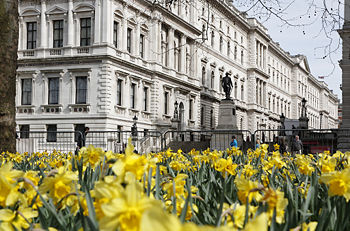Foreign and Commonwealth Office: Difference between revisions
imported>John Stephenson (new) |
imported>Peter Jackson No edit summary |
||
| (5 intermediate revisions by 2 users not shown) | |||
| Line 1: | Line 1: | ||
{{subpages}} | {{subpages}} | ||
{{Image|Uk-foreign-office-2010.jpg|right|350px|The UK's foreign ministry in April 2010.}} | {{Image|Uk-foreign-office-2010.jpg|right|350px|The UK's foreign ministry in April 2010.}} | ||
The '''Foreign and Commonwealth Office''' (FCO), | The '''Foreign and [[Commonwealth of Nations|Commonwealth]] Office''' (FCO), formerly the '''Foreign Office''' and still often termed as such, is the [[United Kingdom]]'s foreign ministry, responsible for the [[country]]'s [[diplomacy|diplomatic]] relations with other nations. The FCO acts to represent and promote British interests overseas.<ref>''FCO'': '[http://www.fco.gov.uk/en/about-us/what-is-the-fco What is the FCO?]'.</ref> | ||
The FCO is headed by the [[Foreign Secretary]], a senior member of the [[Government of the United Kingdom]], who occupies the highest position in the [[government]] after the [[Prime Minister of the United Kingdom|Prime Minister]] and the [[Chancellor of the Exchequer]]. The current Foreign Secretary is [[Dominic Raab]] of the [[Conservative Party (UK)|Conservative Party]]. | |||
The FCO is headed by the [[Foreign Secretary]], a senior member of the [[Government of the United Kingdom]], who occupies the highest position in the [[government]] after the [[Prime Minister of the United Kingdom|Prime Minister]] and the [[Chancellor of the Exchequer]]. The current Foreign Secretary is [[ | |||
The FCO maintains one of the most prestigious UK government buildings, constructed over 1861-1868 in [[Italianate architecture|Italianate]] style; it was originally home to other government departments responsible for administering the [[British Empire]] at home and abroad.<ref>''FCO'': '[http://www.fco.gov.uk/resources/en/pdf/4103709/fco-history.pdf The Foreign and Commonwealth Office]'. .pdf document.</ref> | |||
==Footnotes== | ==Footnotes== | ||
{{reflist|2}} | {{reflist|2}} | ||
Latest revision as of 05:46, 25 July 2019
The Foreign and Commonwealth Office (FCO), formerly the Foreign Office and still often termed as such, is the United Kingdom's foreign ministry, responsible for the country's diplomatic relations with other nations. The FCO acts to represent and promote British interests overseas.[1]
The FCO is headed by the Foreign Secretary, a senior member of the Government of the United Kingdom, who occupies the highest position in the government after the Prime Minister and the Chancellor of the Exchequer. The current Foreign Secretary is Dominic Raab of the Conservative Party.
The FCO maintains one of the most prestigious UK government buildings, constructed over 1861-1868 in Italianate style; it was originally home to other government departments responsible for administering the British Empire at home and abroad.[2]
Footnotes
- ↑ FCO: 'What is the FCO?'.
- ↑ FCO: 'The Foreign and Commonwealth Office'. .pdf document.
